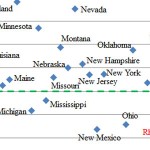“Regular Order” in the U.S. Congress and Rhode Island
Angelo Codevilla summarizes the history of how the U.S. Congress undermined our system of government as the end of “regular order.” By this, he means the process by which laws were supposed to be reviewed in committee and then passed on the floor, all in full view and deliberation, with each legislator ultimately accountable for votes. But…
… For over a century, congressmen and senators’ procrastination had pressed legislative business into the last weeks before the end of congressional sessions. Members had noted that they could slip items into bills in frenzied times, which would not have survived regular order’s scrutiny. In the 1970s, some committees started to procrastinate on purpose, so that the end of the government’s fiscal year would come without an appropriation for one or more department of government. The Appropriations Committee would then prepare a “continuing resolution” to substitute for the uncompleted appropriations. These were supposed to just “keep thing going next year as in the previous year,” thus avoiding all issues. At the very least, they obviated whatever major changes anyone might want to make. But it was never that simple: from the beginning, these CRs always had riders. The more influence you had, the more you could slip into the CR.
This gave leadership more power, because they had more leeway to determine what could and couldn’t be “slipped into” continuing resolutions. In the last decade, according to Codevilla, Harry Reid pushed Congress to the final step, essentially making continuing resolutions the rule for the whole budget and, therefore, the whole government.
If this sounds familiar to local ears, it’s because this is exactly the way in which the Rhode Island legislature operates. The entire session is warm-up and theatrics for a final push during which the action is frenzied, the rules are suspended, and legislative leaders have all of the say.
The solution is the same, too: Voters have to insist on regular order, not a few oligarchs who leverage a weak version of representative democracy for their own benefit. Unfortunately, the corrupt system works well for special interests, too, who corrupt our electoral system.


